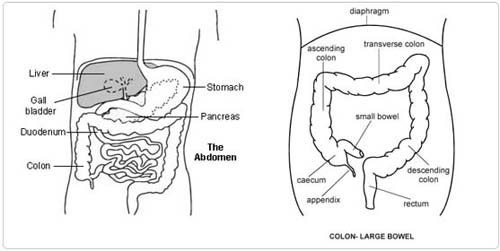What is it?
The bowel is a tube of intestine which runs from the stomach to the back passage. The lower part of the bowel is called the colon. The colon starts just to the right of the waistline and runs up under your ribs, across the tummy and down the left side where it becomes the rectum. Your problem is in the right hand side of the colon. The diseased part of the right colon and a small piece of the upper bowel have to be taken out. The ends of the rest of the bowel are joined up inside the tummy.

The Operation
You will have a general anaesthetic, and will be asleep for the whole operation. A cut is made in the skin in the middle lower part of your abdomen 25cm (10 inches) long. The right side of the colon and the lowest part of the small bowel are freed. The diseased bowel is taken out. The cut ends of the small bowel and of the middle of the colon are joined together. The cut is then closed up. You will not end up with a colostomy or need to wear a bag to collect the bowel waste. You should plan to leave hospital about 10 days after the operation.
Any Alternatives
Simply waiting and seeing is not a good plan. The trouble you are having with the bowel will simply get worse and may well lead to very serious problems. Tablets and medicine will not be helpful, neither will X-ray and laser treatment. Keyhole operations to remove this part of the bowel are possible in very specialised centres. Most centres perform the classic open operation with excellent results.
Before the operation
Stop smoking and get your weight down if you are overweight. (See Healthy Living). If you know that you have problems with your blood pressure, your heart, or your lungs, ask your family doctor to check that these are under control. Check the hospital's advice about taking the Pill or hormone replacement therapy (HRT). Check you have a relative or friend who can come with you to the hospital, take you home, and look after you for the first week after the operation. Bring all your tablets and medicines with you to the hospital. On the ward, you may be checked for past illnesses and may have special tests, to make sure that you are well prepared and that you can have the operation as safely as possible.. You will be asked to fill in an operation consent form. Many hospitals now run special preadmission clinics, where you visit for an hour or two, a few weeks or so before the operation for these checks.
After - In Hospital
You will most likely have a fine plastic tube coming out of your nose and connected to another plastic bag to drain your stomach. Swallowing may be a little uncomfortable. You will have a dressing on your wound and perhaps a drainage tube nearby, connected to another plastic bag. This drains any residual blood from the area of the operation. The wound is painful and you will be given injections and later tablets to control this. Ask for more if the pain is not controlled or gets worse. A general anaesthetic will make you slow, clumsy and forgetful for about 24 hours. The nurses will help you with everything you need until you are able to do things for yourself. Do not make important decisions during this time. You will probably have a fine drainage tube in the penis or front passage to drain the urine from the bladder until you are able to get out of bed easily.
You should be eating and drinking normally after about four to six days. The wound has a dressing which may show some staining with old blood in the first 24 hours. There may be stitches or clips in the skin. Sometimes seven or eight stitches are put across the wound to add strength. Stitches and clips are removed after about 7-10 days. The drain tube is removed after four days or so. You can wash as soon as the dressing has been removed but try to keep the wound area dry until the stitches come out. Soap and warm tap water are entirely adequate. Salted water is not necessary. You can shower or bath as often as you want. You will be given an appointment to visit the outpatient department for a checkup about one week after leaving hospital. The results from the laboratory about your colon condition should be ready then. The nurses will advise about sick notes, certificates etc.
After - At Home
You are likely to feel very tired and need to rest two or three times a day for a month or more. You will gradually improve so that by the time three months has passed you will be able to return completely to your usual level of activity. You can drive as soon as you can make an emergency stop without discomfort in the wound, i.e. after about three weeks. You can restart sexual relations within two to three or weeks when the wound is comfortable enough. You should be able to return to a light job after about six weeks and any heavy job within 12 weeks.
Possible Complications
As with any operation under general anaesthetic, there is a very small risk of complications related to your heart and lungs. The tests that you will have before the operation will make sure that you can have the operation in the safest possible way and will bring the risk for such complications very close to zero.
Complications are relatively unusual but are rapidly recognised and dealt with by the surgical staff. If you think that all is not well, let the doctors or the nurses know. Chest infections may arise, particularly in smokers. Getting out of bed as quickly as possible, being as mobile as possible and co-operating with the physiotherapists to clear the air passages is important in preventing the condition. Do not smoke. Occasionally the bowel is slow to start working again. This may take a week or more. Your food and water intake will continue through your vein tubing until you pass wind or open your bowels. Sometimes there is some discharge from the drain near the wound. This stops given time. Wound infection is sometimes seen. This happens relatively more frequently in any bowel operation compared to other 'clean' operations such as taking out your gallbladder and the reason is that the bowel has many bugs that can cause an infection. The infection settles down with antibiotics in a week or two.
Very rarely, during the operation, another part of your bowel, your bladder or a blood vessel can be damaged and this may require another operation to deal with the problem.
One potential major complication is a leak from the area where the two parts of your bowel were put back together. The chance of a leak is up to 15% and is more frequent in patients whose wounds take longer to heal, such as elderly people, diabetics and patients suffering from cancer. If a leak happens you will stop eating and drinking for several days until the bowel heals completely. In the meantime you will be given all the food and water you need via a catheter in one of your veins. This often corrects the problem but sometimes another operation is needed to control the leak.
Aches and twinges may be felt in the wound for up to six months. Occasionally there are numb patches in the skin around the wound which get better after two to three months. Because of loss of some of the bowel you may need some vitamin replacement. This will be discussed with you.
Advanced Reproductive Technology
- In Vitro Fertilisation (IVF)
- Intracytoplasmic Sperm Injection (ICSI)
- Donor egg and embryo programs
- In Vitro Fertilisation (IVF)
- Pre-implantation genetic diagnosis (PGD)
- Surrogacy programs
Dental Videos





